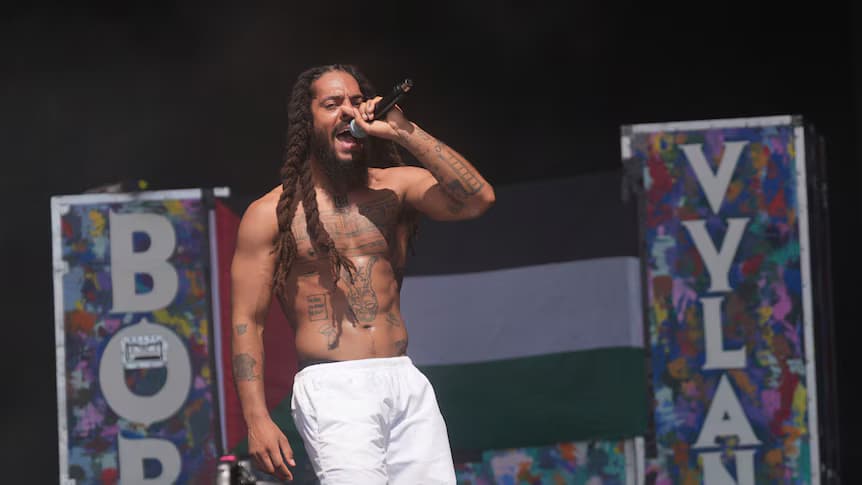We're loading the full news article for you. This includes the article content, images, author information, and related articles.
British punk duo Bob Vylan's frontman, Bobby Vylan, has reiterated his lack of regret over chanting "Death to the IDF" at Glastonbury, sparking renewed debate on artistic freedom and political expression, a topic that resonates with varying opinions in Kenya regarding the Israel-Palestine conflict.

British punk-rap artist Bobby Vylan, whose real name is Pascal Robinson-Foster, has firmly defended his controversial "Death to the IDF" chant made during Bob Vylan's performance at the Glastonbury Festival in June. In his first interview since the incident, Vylan told The Louis Theroux Podcast that he is "not regretful" and would "do it again tomorrow, twice on Sundays."
The chant, referring to the Israel Defense Forces, drew widespread condemnation from various quarters, including Glastonbury organisers and UK Prime Minister Keir Starmer, who labelled it "appalling hate speech." The backlash led to Bob Vylan being dropped by their agency, UTA, and the revocation of their US visas, forcing the cancellation of a North American tour.
Vylan, however, downplayed the impact of the criticism, stating it was "minimal compared to what people in Palestine are going through." He further asserted that the chant itself was "unimportant," with the focus instead being on "the conditions that exist to allow that chant to even take place on that stage," referring to the situation in Palestine.
The incident at Glastonbury has ignited discussions globally about the intersection of artistic expression and political activism, particularly concerning the Israel-Palestine conflict. In Kenya, public opinion on the conflict is divided. While some Kenyans express strong solidarity with the Palestinian cause, drawing parallels to Africa's own history of colonialism and oppression, others view Israel as a crucial ally in counter-terrorism efforts, especially against groups like Al-Shabaab.
Kenya officially supports a two-state solution to the Israel-Palestine conflict, based on pre-1967 borders. This position was recently enshrined in law through a 2025 sessional paper passed by Parliament, making Kenya one of the few countries to legislate its stance.
Despite the official two-state solution policy, Kenya's diplomatic actions have shown some inconsistencies. Under former President Uhuru Kenyatta, Kenya was a vocal supporter of the Palestinian cause, backing several UN resolutions critical of Israel. However, under President William Ruto's administration, there have been shifts. For instance, in November 2022, Kenya voted in favour of Palestine's request to the International Court of Justice (ICJ) for an advisory opinion on Israel's occupation of Palestinian territories, only to reverse its position a month later and vote against it.
President Ruto condemned the Hamas attack on Israel in October 2023 and initially endorsed Israel's policy, affirming Kenya's solidarity with Israel and unequivocally condemning terrorism. However, a recent UN General Assembly session saw Kenyan Ambassador Ekitela Lokaale condemn humanitarian atrocities in the Middle East, particularly in Gaza, suggesting a potential move towards a more balanced approach by the Kenyan government.
The Palestinian Ambassador to Kenya, Hazem Shabat, has consistently called for an end to illegal Israeli settlements in the West Bank and highlighted the severe humanitarian crisis in Gaza. Conversely, some Kenyan citizens, like Nairobi businessman Vincent James Kamau, support the government's stance with Israel, citing Israel's assistance in intelligence-sharing and counter-terrorism efforts.
Kenyan civil society and activist groups, including Kenyans for Palestine and Muslim Imams, have organised protests and expressed strong support for Palestinians, often facing government crackdowns. In August 2025, Kenyan Members of Parliament debated the war in Gaza, with many condemning the devastation and calling for urgent international action and recognition of the State of Palestine.
The BBC's broadcast of Bob Vylan's performance also drew criticism, with the corporation's executive complaints unit finding it breached editorial standards. Vylan, however, claimed BBC staff praised their set immediately after the performance, before the backlash. The incident has also led to accusations of antisemitism, which Vylan has rejected, stating he does not believe he created an unsafe atmosphere for the Jewish community.
The ongoing debate surrounding artistic freedom and political expression, particularly concerning the Israel-Palestine conflict, is likely to continue. In Kenya, the government's diplomatic balancing act between its historical support for Palestine and its strategic alliance with Israel will remain a key area of observation. The upcoming UN summit aimed at resolving the conflict and rebuilding Gaza, as mentioned by Prime Cabinet Secretary Musalia Mudavadi, will be a critical event to watch.
Keep the conversation in one place—threads here stay linked to the story and in the forums.
Sign in to start a discussion
Start a conversation about this story and keep it linked here.
Other hot threads
E-sports and Gaming Community in Kenya
Active 9 months ago
The Role of Technology in Modern Agriculture (AgriTech)
Active 9 months ago
Popular Recreational Activities Across Counties
Active 9 months ago
Investing in Youth Sports Development Programs
Active 9 months ago